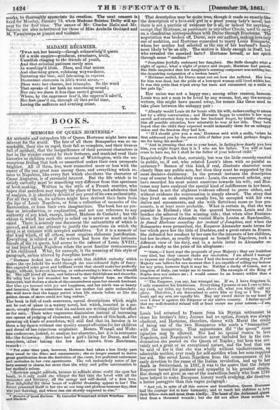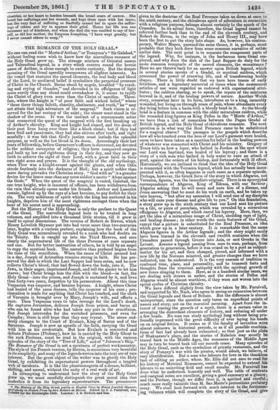B OOKS.
MEMOIRS OF QUEEN HORTENSE.* AN accurate and outspoken life of Queen Hortense might have some interest for the world. The fate of all these Bonapartes was so re- markable, their rise so rapid, their fall so complete, and their lives so full of incident, that the insignificance of their personal characters is lost in the wonder created by their fortunes, and mankind read their histories as children read the account of Whittington, with the un- conscious feeling that luck so unmerited makes their own prospects brighter. All of them, too, were connected more or less with the career of the one great man among them, and everything which re- lates to Napoleon, like every fact which elucidates the character of Ctesar Augustus, is of perennial interest. But the life 'which is to satisfy curiosity must be' something very different from this specimen of book-making, Written in the style of a French courtier, who hopes that anecdote may supply the place of facts, and adulation that of analysis, it is absolutely devoid of any proof of its own authenticity. For all they tell us, its authors might have derived their facts from the lips of Louis Napoleon, or from a collection of memoirs of the Restoration, or from their own imaginations. The book has no pre- face or introduction, or explanation, and not one reference to any authority of any kind, except, indeed, Madame de Cochelet ; but the eitent to which her authority is relied on is neVer so much as indi- cated. There is scarcely one document the authenticity of which is proved, and not one attempt to justify the assertions on which the story is at variance with accepted narratives. Yet it is a memoir of that kind which, of all others, most requires elaborate justification. Everything is related as if the writers 'bad been the most intimate friends of the ex-queen, had access to the cabinet of Louis XVIII., or had heard Louis Napoleon relate the most familiar reminiscences of his childhood. What, for example, is the meaning of this style of Paragraph, unless uttered by Josephine herself: "Hortense looked into the future with that childish curiosity which makes the eye behold the world through the rose-coloured light of fancy. She expected some great and brilliant event that should make her perfectly happy, without, however, knowing, or endeavouring to know, what it would be. She still loved all men,-and believed in their faithfulness and sincerity. No sting had as yet wounded her heart, no blighted hope, no illusion destroyed, bad thrown a shade of discontentedness upon her smooth forehead. Her blue eye beamed with joy and happiness, and her mirth was so hearty and innocent, that it sometimes made her mother feel quite melancholy. She well knew that the happy period when life stands before us like the golden dream of Morn could not long endure."
The book is full of such sentences, unreal descriptions which might not be out of place in a watery novel, but which, inserted in a me- moir, simply demonstrate that its authors are writing either for effect or for sale. Their utter vagueness diminishes instead of increasing our means of judging of character, and the readers of this book, after perusing all kinds of anecdotes, will still find that its heroine is to them a lay figure without one quality except affection for her children and dread of her imperious stepfather. Messrs. Wraxall and Wehr- han endeavour, indeed, to analyze her character, but it is in sentences like the following. Hortense had a girl's liking for Dorm, and the compilers, after taking the few facts known from Bonrienne, remark: "For some time past, however, Hortense had taken a less lively part than usual in the fetes and amusements; she no longer seemed to derive great gratification from the festivities of the court, put preferred retirement and seclusion in her own apartments. The soft melancholy notes of her harp seemed to charm her more than the witty and polite conversation in her mother's salons.
"Hortense sought solitude, because to solitude alone could she open her heart, to it only could she whisper the fact that she loved with all the Innocence and fervency, all the energy and self-denial, of a first love. How delightful did these hours of wakeful dreaming appear to her! The future presented itself to her eye as one long and glorious summer day, that was just dawning, and whose sun she shortly expected to rise."
• Memoirs Of Queen Hortense. By Laseellea Wraxall and Robert Wehrhan. Hurst and Blackett.
That description may be quite true, though it reads so exactly like the description of a love-sick girl in a good young lady's novel, but there is not a particle of evidence for it all, or indeed for anything, except that Hortense, as passionate as any other Creole, used to carry on a clandestine correspondence with Duroc through Bourienne. The negotiation was broken off, Duroc, says our authors, making love only Out of ambition, and Hortense consented to marry Louis Bonaparte, whom her mother had selected as the one of her husband's family most likely to'be an ally. The motive is likely enough in itself, but who revealed the annexed facts? Hortense herself or her spirit through some " medium ?"
"Josephine joyfully embraced her daughter. She little thought what a night of agony, what a night of prayer and despair, Hortense had passed. She little suspected that her daughter's seeming composure was nothing but the despairing resignation of a broken heart." " Hortense smiled, for Dorm must not see how she suffered. Her love for him was dead, but the pride of a betrayed woman still lived within her. It was this pride that wiped away her tears and summoned up a smile to her pale lip."
Her union was not a happy one; among other reasons, because Louis was not a man to be loved by any woman, but, say the memoir writers, this might have passed away, for scenes like these used to take place between the unhappy pair :
"Already would Louis sit for hours with his wife, endeavouring to amuse her by a witty conversation; and Hortense began to consider it her most sacred and sweetest duty to make her husband forget, by kindly showing him all possible attention, how miserable he was at her side. They both hoped that the child they expected would indemnify them for an unhappy union and the freedom they had lost.
" 'If I should give you a son,' Hortense said with a smile, 'when he first addressed you by the sweet title of father you would perhaps forgive me for being his mother.'" "And in pressing that son to your heart, in feeling how dearly you love him, you might forget that it is I who am his father. You will at least cease to hate me, for I shall be the father of your beloved child.'"
Exquisitely French that, certainly, but was the little comedy enacted in public, or, if not, who related Louis's ideas with so painful an accuracy? Scenes of this kind, if real, illustrate character more clearly than any public acts, but then they must be supported by the most decisive-testimony. In the present instance the description may of course he absolutely exact : Louis, the reserved scholar, may have recorded his most secret emotions towards his wife, and Hor- tense may have analyzed the special kind of indifference in her heart, but there is not the slightest evidence offered to prove either, and without evidence the conversation is simply absurd. The story that they lived as such couples usually live, he occupied with his own duties and amusements, and she with flirtations more or less pro- nonces, is at least more probable. What is certain is, that she was popular in Holland; that in the quarrel between Louis and his brother she adhered to the winning side; that when after Fontaine- bleau the Emperor Alexander visited Maria Louisa at Rarnbouillet, he foanzd Hortense consoling her instead of Josephine, and when the Bonapartes were proscribed, the Emperor Alexander made terms for her which gave her the title of Duchess, and a great estate in France. She defended her conduct by her care for the interests of her children, but her brother, as cruelly wronged as herself by Napoleon, took a different view of his duty, and in a noble letter to Alexander re- /used a-duchy as the price of his allegiance: " Sinz,—I have read the proposals of your Majesty; they are doubtless very kind, but they cannot shake my resolution. I am afraid I manage to express my thoughts badly when I had the honour of seeing you, if your Majesty can believe for one moment that I am capable of selling my honour for any price, however high it may be. Neither a duchy of Genoa nor a kingdom of Italy, can tempt me to treason. The example of the king of Naples does not seduce me ; I would sooner be an honest aoldier than a treacherous prince. "The Emperor you say, has wronged me. If so, I have forgotten it. I only remember his kindnesses. Everything I possess or am I owe to him; my rank, my titles, my fortune, and, above all, what you kindly call my glory. Therefore, I am determined to serve him as long as I live. My heart and my arm are equally his. May my sword shiver in my band if ever I draw it against the Emperor or my native country. I flatter myself that my well-founded refusal will at least secure me your esteem.—I am? &c.
Louis bad returned to France from his Styrian retirement to share his brother's fate; Jerome had no option, joseph was always obedient, and Hortense, therefore, shares with Murat the credit of being one of the two Bonapartes who made a "transaction' with the conquerors. That appearances did "the queen" some injustice may be allowed. She had to special reason to love Napoleon, and Napoleon's mother never included her in the con- demnation she passed on the Queen of Naples ; but hers was cer- tainly not a great or an exceptional nature, and the best that can be said of her is that she was wholly without vindictiveness, an admirable mother, ever ready for self-sacrifice when her sons required her aid. She saved Louis Napoleon from the consequences of his early devotion to the cause of the Italian revolution, and up to her death in Switzerland, in 1837, it was to the queen that the future Emperor turned for guidance and sympathy in his greatest straits. Bat though not great as one of the marvellous family who from 1785 have helped to make European history worth studying, she deserves a better panegyric than this vague paragraph : "And yet, in spite of all this sorrow and humiliation, Queen Hortense had the courage not to hats humanity, and to teach her children to love their fellow-men and treat them kindly. The heart of the dethroned queen bled from a thousand wounds; but she did not allow these wounds to
cicatrize, or her heart to harden beneath the broad scars of sorrow. She loved her sufferings and her wounds, and kept them open with her tears; but the very fact of suffering so fearfully caused her to spare the suffer- ings of others and try to appease their grief. Hence her life was one incessant act of kindness, and when she died she was enabled to say of her- self, as did her mother, the Empress Josephine, 'I have wept greatly, but I never caused others to weep."





























 Previous page
Previous page